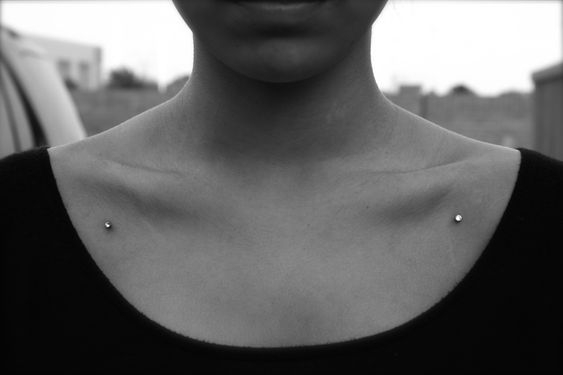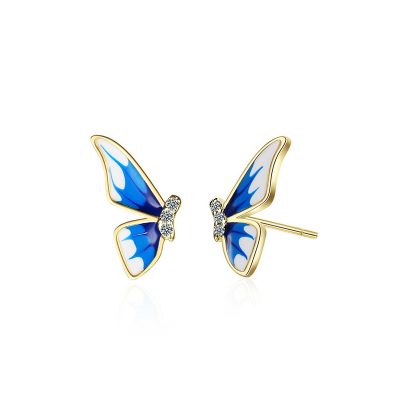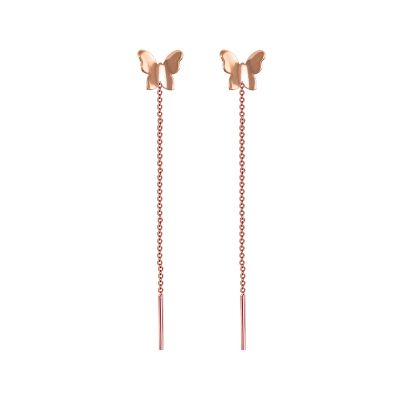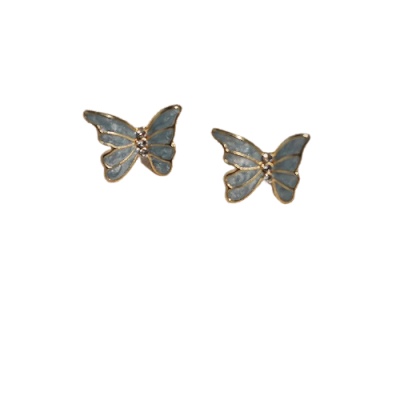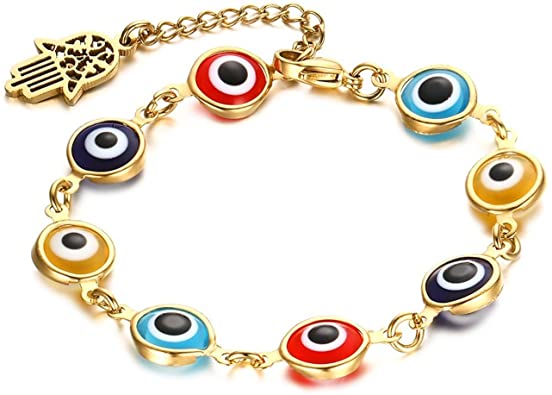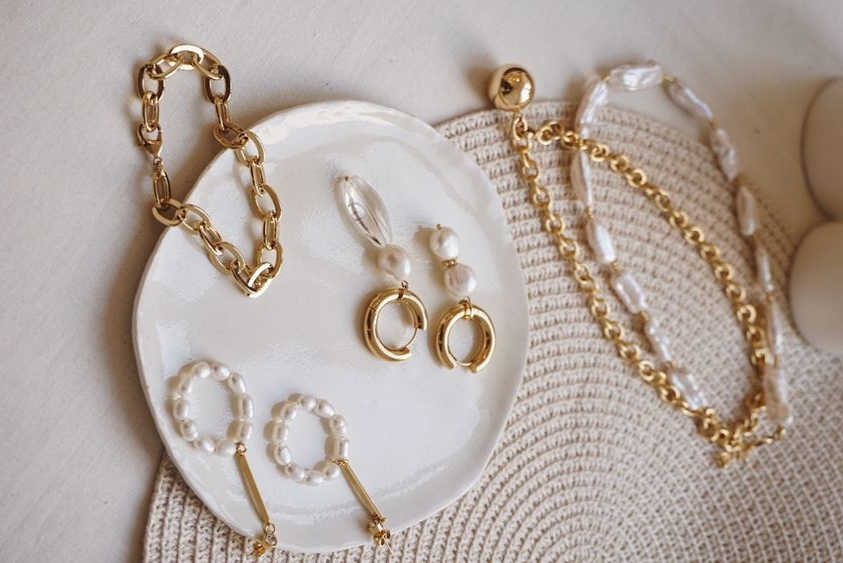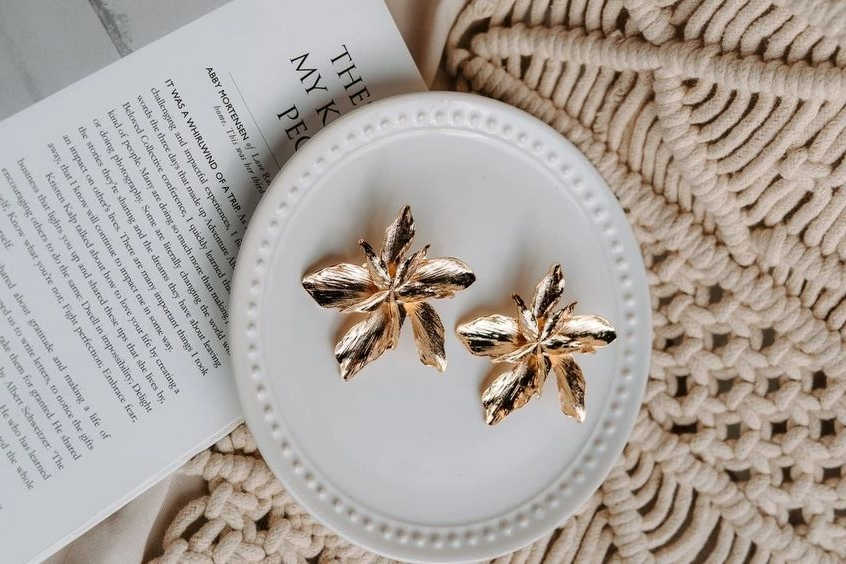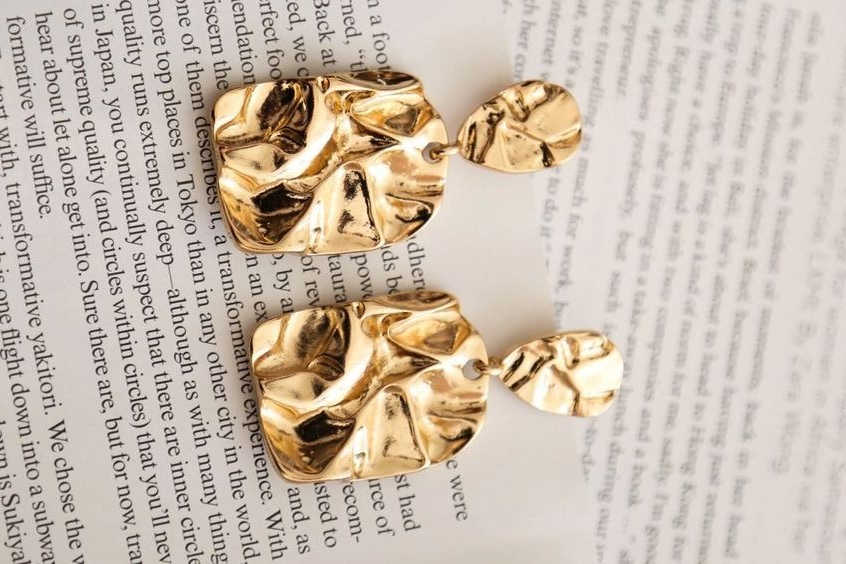The Location of Your Piercing Matters
According to Ouellette, the location of your piercing can definitely make a difference. “The act of piercing creates a channel through the skin. During healing your body produces epithelial [skin] cells along the jewelry from the outside-in,” he tells me. “Once the new cells [have formed] all the way along the length of the piercing they mature into a fistula [which] is basically a tube. Once fully matured, fistulas can stay open for months or years after [the] jewelry [has been] removed and some fistulas mature thicker and heartier than others.” Ouellette explains, for example, that a fistula on a navel or nipple can stay open much longer than a nostril because the interior of the nasal cavity is lined with mucosa.
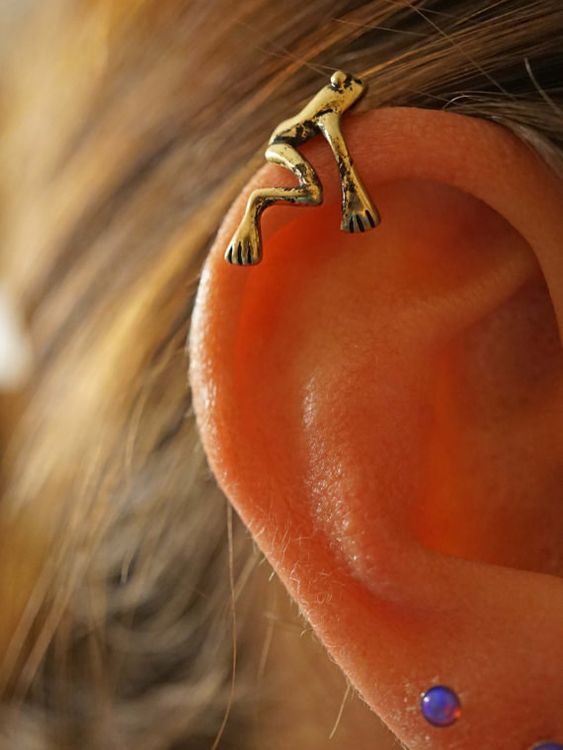
How Long Does It Take A Lobe Piercing To Close?
Within the first six months of having a lobe piercing, it closes rapidly. The exact time varies between different bodies. But, during the healing phase, most lobe piercings will close within 24 hours without jewelry. Once healed, the lobe closes slowly.
In the earlobe, fistulas can form easily. A fistula, in this instance, is an abnormal connection between blood vessels. The formation of this fistula means your body has adapted to having the piercing. As a result, it will often stop trying to close the hole.
Often, once you have a lobe piercing for three to four years, the lobe piercing may never fully close on its own.
How Long Does A Helix Piercing Take To Close?
Like a lobe, helix piercings can take as long as six months to fully heal. During this period, the hole can close up quickly if the jewelry is removed. Removing jewelry from an unhealed piercing can also cause complications and irritation – leave it in, even if it’s uncomfortable or infected.
After having a helix piercing for a couple of years it will take a long time for the piercing to close. Many people remove it for up to a week at a time. The first time you remove the jewelry for an extended period you may want to check periodically to ensure the hole is not closing. This can make reinsertion uncomfortable or impossible.
The reason the helix is slow to close once healed is that there is limited blood flow to this area. Higher blood flow would stimulate the healing process.
How Long Do Nostril Piercings Take To Close?
The inside hole of a nostril piercing can close quickly. The inside of your nostril has a mucous lining that can close a hole quickly. The inside hole of a new nostril piercing can close within a day. The outside hole, on the other hand, takes significantly longer.
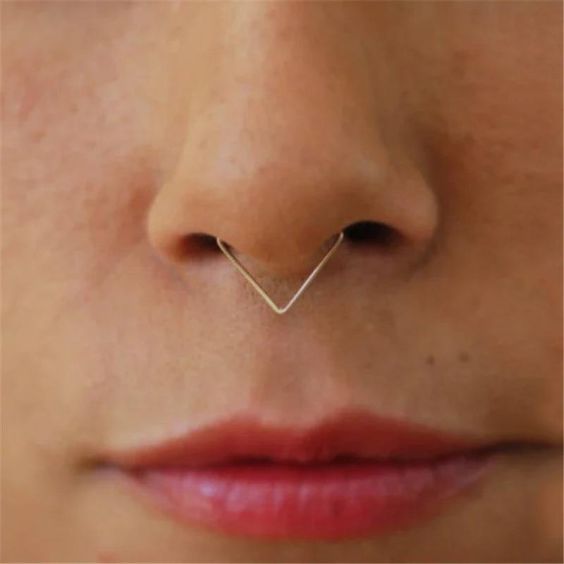
The outside of the nose is dryer and has no protective lining. In some cases, the hole will stay open for years, even though the inside hole closed long before. The external hole of the nostril piercing is not too noticeable, usually, it ends up resembling an enlarged pore.
How Long Does It Take A Conch Piercing To Close?
As with many cartilage piercings, when you get a conch piercing the hole itself is usually permanent once fully healed. However, the skin can heal over the hole. When this happens, you can still feel where you had the piercing with your fingers, but it may not be visible.
This piercing has the potential to close up quickly, especially when it is newer. Some people cannot keep jewellery out for a day, others can go weeks or even a month without it closing. In part, this variance is due to people’s’ bodies having different healing capabilities.
The other aspect is that conch piercings have a wide variation in how long they take to fully heal. For most people, the conch takes six months to a year to completely heal. But, for some, it can take as long as two years. With a piercing that can take a year longer to heal than usually expected, it’s easy for someone to have the piercing close up once they would have expected the piercing to already be healed.
How Long Do Tragus Piercings Take To Close Up?
As with the conch piercing, the tragus piercing hole itself doesn’t close once fully healed. Instead, the skin simply closes over the hole. Within the first 6 months this piercing can close in a matter of hours. After a year, it can take days or even weeks to close.
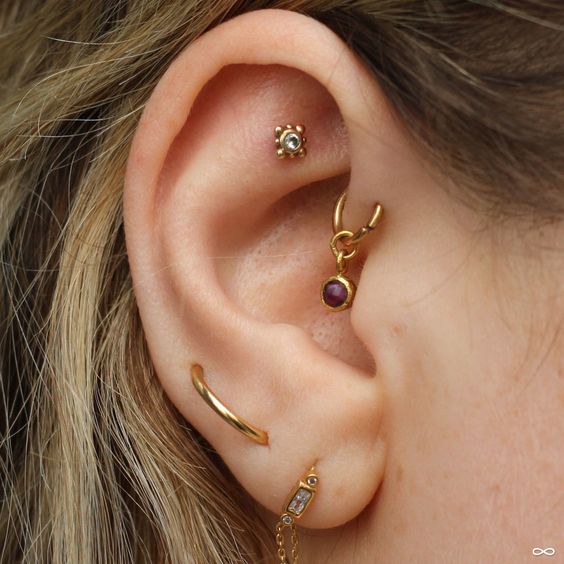
If you’ve had the tragus piercing for three or four years the hole will generally close slowly, and may never fully close. However, this won’t be immediately obvious as the skin will almost close, only be noticeable upon close inspection. Fortunately, this makes it easy if you do one day want to reopen the piercing.
How Long Does It Take A Nipple Piercing To Close?
Nipple piercings are one of the fastest piercing to close. When they’re new, they can close in minutes. Even after a few years, nipple piercings can close inside of a week without jewellery. For some, the hole can stay open for years on its own, although this is rare.
Although it is a myth that you can’t breastfeed with a nipple piercing, we still recommend you remove the jewellery during breastfeeding sessions. This is because the jewellery itself can present a potential choking hazard. Provided your piercing is fully healed, it will usually stay open during breastfeeding sessions.
Some people choose to remove the nipple piercing until the baby has outgrown breastfeeding, instead of having to remove and replace before and after each feeding. Over this period of time, most nipple piercings will close.
How Long Does A Navel Piercing Take To Close?
Navel piercings are surface piercings. As a rule, surface piercings tend to close quickly. However, individual experience varies greatly with belly button piercings.
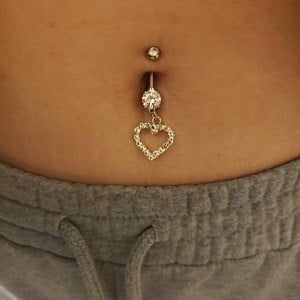
While a fresh belly button piercing closes quickly, after a couple years some people find it closes within a few weeks. For others, it never closes, instead, the hole simply gets smaller but remains visible.
New piercing holes are more likely to close quickly
If you’ve ever gotten your ears pierced, you know how important it is to keep earrings in for a while. But why are new piercings so eager to close up in the first place?
“If you have a brand new piercing, your hole can close in a few hours,” Studs co-founder and CMO, Lisa Bubbers, told TODAY Style.”When you create a hole in your ear, your immune system kicks into gear and tries to heal and repair that hole.”
The rate at which a piercing heals varies from person to person and can also depend on what type of piercing you get, but typically, a new earlobe piercing will heal in 6-12 weeks. Piercings further up the ear (especially those involving cartilage) can take several months.
To help speed up the healing process, Bubbers recommends wearing earrings made of implant-grade metal so your body will form a healed layer around the metal. You also should avoid going any longer than 24 hours without wearing earrings for the first six months of a new piercing to prevent the hole from closing.
Can You Save A Closed Piercing?
Sometimes a piercing closes unexpectedly. Maybe your friends had a similar piercing that they could leave without jewellery for weeks and be fine, but yours closed in a few days. It happens, after all, everyone’s body chemistry is different. Fortunately, your piercing may be salvageable.
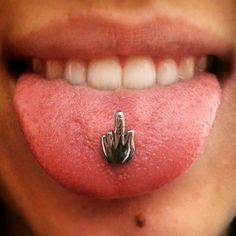
If your piercing closes and you want to reopen it, visit your piercer. Often the skin doesn’t fully close over the hole, so there’s no need to repierce. Instead, the piercer can reopen the piercing using a taper and some vaseline.
If the skin does completely close, your piercing shop can advise you on whether you can pierce the area again or need to leave more time for further healing first.
The Age Of The Piercing Can Have An Effect
As long as your piercing has completely healed and remained healthy, the length of time since you were in that piercer’s chair will likely affect how quickly it closes. Ouellette cautions that there isn’t a guarantee it will remain open with jewelry installed, but typically, the older the piercing the slower the close.
Irritation Will Mess With Closing Time
If a piercing is irritated it may close up much faster once the jewelry is removed. According to Ouellette, that can even happen in the same day because of the inflammation and discharge that problematic piercings usually have. “Both those [factors] keep a healthy fistula from maturing.” Ryan explains. Of course, once your piercing has become irritated, it’s best to consult a piercing professional before you remove your jewelry to be on the safe side.
Not All Piercings Will Close On Their Own
Unfortunately, not every piercing will fully close by itself. For example, some people can go years without wearing earrings without the holes fully closing. Ouellette explains that this “is because the lobe heals a very tough fistula and this isn’t limited to the earlobe — if a piercing forms a mature fistula it will tighten over time, but [it] may not fully ‘close’ for quite some time.” So if you really want to get daring with your piercing, stick to the earlobes.
Re-Piercing Isn’t Always Advised
According to Ouellette, if an old piercing was scarred before you took the piercing out and you repierce that same location, it may cause complications. “Particularly if the scar is from rejection, if the old fistula has fully closed and been reabsorbed by the body, then [it’s less likely it will affect how quickly the piercing closes]. Scar tissue is much weaker than healthy tissue, so once a piercing rejects it should not be re-pierced in most cases. Piercing through an older, partially closed, fistula is not very problematic. Piercing under an abandoned fistula can cause bacteria and oils to build up in the old site causing drainage problems similar to acne at the site.” Ouellette suggests consulting an experienced professional piercer before re-piercing an old site.
Closing A Piercing Doesn’t Always Mean Scarring
IMO, the only thing scary about a piercing is the future scar it leaves when you are ready to close it for good. According to Ouellette, it doesn’t have to be that way. “Removing the piercing when it is healthy is one of the best ways to avoid excess scar tissue. If the piercing is angry from improper aftercare or low quality jewelry causing an allergic reaction the body will have a higher tendency to produce scar tissue,” he says. Sadly, Ouellette advises there aren’t any products out there that will close up your piercing sans scar — that means the better you take care of your piercing the better closing experience you will have.
If Cartilage Is Involved, Expect A Quicker Close
If you’ve heard the myth that surface piercings close faster than other locations, you are not alone. Although it’s possible for a well healed surface piercing to close faster, Ouellette explains that it should typically heal at the same speed as other healthy piercings. Nostril and cartilage piercings, however, may close faster than others not through cartilage. “Cartilage piercings may close due to the lack of blood supply to cartilage. When jewelry is removed, the body may heal the hole with scar tissue, particularly if it was irritated from wearing cheaper jewelry.”
Ten articles before and after
Nose Ring Bone Vs Screw Nose Ring
Which type of nose ring is best for big nose?
Is Stainless Steel Or Surgical Steel Better For Earring Piercings?
Does Brass Turn Your Skin Green?
